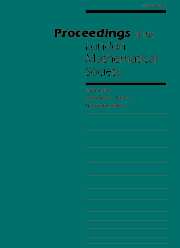Article contents
Analytical functional models and local spectral theory
Published online by Cambridge University Press: 01 September 1997
Abstract
In 1959 E. Bishop used a Banach-space version of the analytic duality principle established by e Silva, K\"{o}the, Grothendieck and others to study connections between spectral decomposition properties of a Banach-space operator and its adjoint. According to Bishop a continuous linear operator $T \in L(X)$ on a Banach space $X$ satisfies property $(\beta)$ if the multiplication operator ${\cal O}(U,X) \rightarrow {\cal O}(U,X),$ $f \mapsto (z-T)f,$ is injective with closed range for each open set $U$ in the complex plane. In the present article the analytic duality principle in its original locally convex form is used to develop a complete duality theory for property $(\beta)$. At the same time it is shown that, up to similarity, property $(\beta)$ characterizes those operators occurring as restrictions of operators decomposable in the sense of C. Foias, and that its dual property, formulated as a spectral decomposition property for the spectral subspaces of the given operator, characterizes those operators occurring as quotients of decomposable operators. It is proved that, unlike the situation for commuting subnormal operators, each finite commuting system of operators with property $(\beta)$ can be extended to a finite commuting system of decomposable operators. Meanwhile the results of this paper have been used to prove the existence of invariant subspaces for subdecomposable operators with sufficiently rich spectrum.
1991 Mathematics Subject Classification: 47A11, 47B40.
- Type
- Research Article
- Information
- Proceedings of the London Mathematical Society , Volume 75 , Issue 2 , September 1997 , pp. 323 - 348
- Copyright
- London Mathematical Society 1997
- 31
- Cited by


